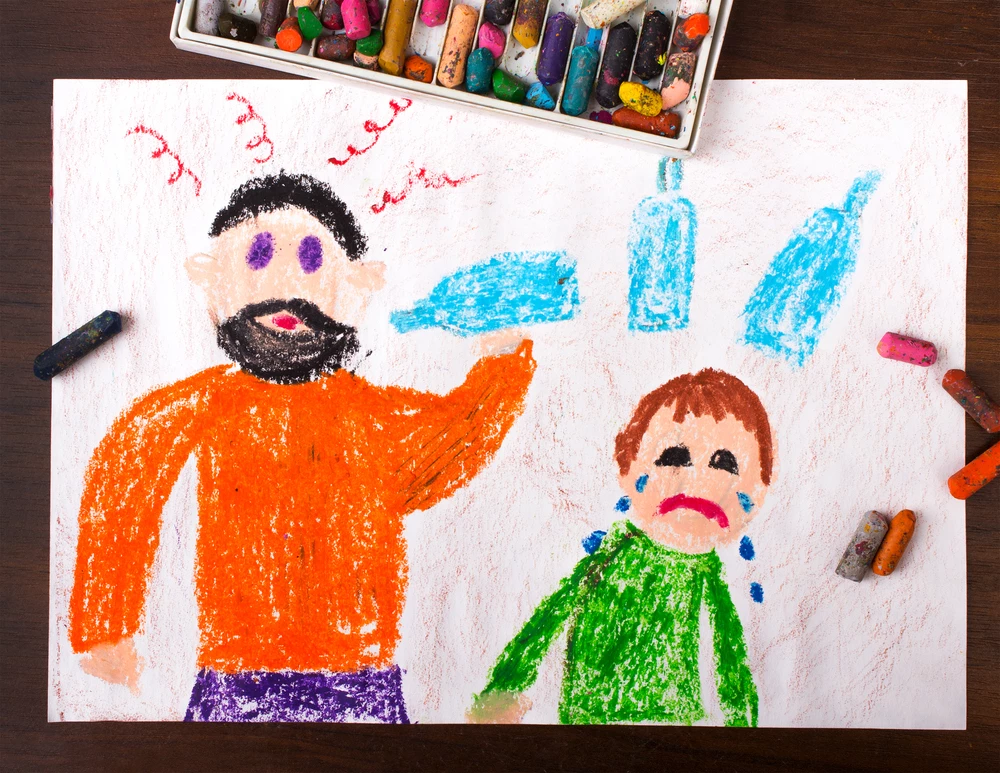Dealing with addiction in the family can leave us feeling isolated. If you’ve seen a loved one struggle with alcoholism, you know that the effects extend far beyond the person drinking. It strains relationships with affected family members (AFM) and loved ones as we worry about their health, see changes in behavior, and get tired of hearing broken promises. You might find yourself walking on eggshells, constantly dreading the next outburst or feeling paralyzed by the burden of wanting to help but not knowing how.
Despite the vast challenges, there’s nearly always a path towards recovery for your loved one, and there’s a way to keep yourself safe while helping them navigate it. In this blog, we will help you understand how widespread this problem is, how to ensure your needs are met, and ultimately realize you don’t have to be alone in your journey.
What Are the Effects of Alcoholism on Families and Relationships?
The effects of alcoholism (alcohol use disorder or AUD) on families and significant others is multifaceted. While our individual family dynamic is completely unique, there are some common results that occur when a loved one’s alcohol misuse seeps into every corner of our lives:
- Emotional Instability: Living with someone who misuses alcohol can create an emotional whirlwind within the family, promoting stress, fear, anger, and sadness. The unpredictability that comes with alcohol misuse can also leave us constantly nervous, as we never know what’s coming next.
- Communication Breakdown: Open, honest, and respectful communication is a cornerstone of strong relationships. Unfortunately, alcoholism can cause people to do things they would never consider when sober, which undermines this, leading to misunderstandings, unexpressed emotions, and feelings of isolation.
- Broken Bonds: The bond between family members is often challenged and reshaped by the impact of alcohol. Trust erodes, affection wanes, and relationships that once thrived may struggle to survive amidst the chaos caused by alcohol.
- Role Reversal: Sometimes, when a family member cannot care for themselves, we see a role reversal. This primarily affects children, who find themselves taking on adult responsibilities, which can hinder their emotional growth and the formation of healthy relationships.
- Empathy Burnout: We only have so much to give, and the families of those affected by alcohol may experience their emotional reserves being drained as they are frequently called upon to intervene, assist, and support. Over time, this can lead to exhaustion, resentment, and even the deterioration of their own mental health.
- Physical and Emotional Harm: The harm caused by alcohol can take many forms, from the physical risks of accidents and violence to the emotional damage of neglect and verbal abuse.
- Enabling Behaviors: It’s natural for us to want to help our loved ones. However, in an effort to reduce conflict, alleviate stress, or normalize the situation, families can unintentionally enable a loved one’s alcohol misuse. This could involve covering up their behaviors, taking on their responsibilities, or financially supporting their addiction. While the intentions are good, this can worsen the problem and stop them from getting the help they need.
- Inconsistent Care: SUDs are time consuming – medical emergencies, appointments, or just being unable to be left in charge of children all mean that an alternative needs to be found, with other AFM being left to bear this burden. This, in turn, adds on additional pressure. Coupled with the fact that addiction raises the likelihood of divorce means that children are often left with erratic and unpredictable schedules where they don’t know who is going to be taking care of them.
How Does Alcohol Addiction Affect Family Finances?
AUD’s impact extends beyond our health, and it’s not just the emotional and relationship turmoil that families must deal with. The ripples also affect our financial stability and security, and we often find ourselves grappling with severe financial problems as a result.
At its most basic level, buying alcohol regularly is expensive. If someone spends $20, $30, or $40 on alcohol each day, the costs over a year can be quite shocking. Here’s a simple breakdown:
| Daily Spending | Annual Cost |
|---|---|
| $20 | $7,300 |
| $30 | $10,950 |
| $40 | $14,600 |
Yet, this is only the tip of the iceberg. There are numerous hidden costs associated with alcohol misuse, such as medical expenses due to health issues caused by excessive drinking, lost wages from missed work, and potential legal problems. For example, one DUI or a hospital visit from falling over while intoxicated could run into the thousands.
Alcohol addiction can also lead to bad financial decisions, putting the family finances at even greater risk. It doesn’t take long to make an unaffordable impulsive purchase online, and problematic gambling frequently co-occurs with heavy drinking.[1] Additionally, money spent on alcohol is usually taken from the family budget — funds that could have been allocated to education, family outings, savings, or investments.
The financial strain of dealing with an alcohol addiction adds another layer of tension and worry to the family unit, impacting not only present circumstances but potentially future ones as well.
[1] Resource: Martinac, Marko, et al. “Alcohol and Gambling Addiction.” Neuroscience of Alcohol, 2019, pp. 529–535, https://doi.org/10.1016/b978-0-12-813125-1.00054-4. – Link
How Can Families Cope With Financial Problems Caused by Alcoholism?
When a family member is struggling with AUD, it can seem like a daunting task to navigate the financial consequences. However, there are several strategies to help alleviate the stress and manage the financial burdens associated with alcohol use disorder.
A crucial initial step is acknowledging the financial impact of the problem. This recognition can aid you in formulating a comprehensive plan to manage resources more effectively. Financial planning and budgeting are indispensable in these circumstances as they enable you to understand the financial landscape better and make more informed decisions.

Seeking professional assistance is another viable approach. Financial advisors or counselors can provide critical advice on managing debt, creating a sustainable budget, and rebuilding financial health over time. They offer a clear, unbiased perspective, helping families develop effective strategies for financial recovery.
Simultaneously, it’s essential to focus on the root of the problem – the addiction itself. Supporting a family member in their journey towards recovery can be beneficial and can involve:
- Finding suitable treatment options
- Utilizing community resources
- Encouraging attendance at local support groups
- Seeking inpatient treatment
Alcohol Misuse and Marital Problems
Alcohol misuse can put a massive strain on a marriage, altering the dynamics of a relationship built on mutual understanding and support. As numerous studies reveal, excessive alcohol consumption can lead to instability and dissatisfaction within a marriage, and in some instances, it can even result in aggressive behavior.[2][3] However, it’s vital to remember that these are not the fault of the individuals involved but challenging symptoms of dealing with alcohol misuse within a family unit.
Some of the most common impacts are:
- Breach of Trust: Alcohol misuse often leads to inconsistent behavior and neglect of responsibilities, eroding the trust relationships need to survive. This can range from not fulfilling household duties to not showing up to important events and even neglecting children.
- Health Complications: This won’t be surprising news, but people who drink excessively often suffer from hangovers, and it’s hard to feel that we’re domestic equals when our partner can’t even get out of bed. It can also damage physical health and, in some instances, cause serious health complications. This increases stress and can lead to additional caregiving burdens, which isn’t what we signed up for initially!
- Legal and Financial Ramifications: Excessive alcohol consumption can result in legal issues such as DUI charges or accidents. Furthermore, the cost of alcohol, coupled with the potential loss of employment or legal fees, can significantly strain family finances.
- Impaired Family Environment: Regular alcohol misuse can contribute to an unhealthy family environment, adversely affecting children. Research indicates that children with at least one parent suffering from addiction are at an increased risk of developing similar issues and other mental health conditions themselves.[4]
[2] Resource: Ostermann J, Sloan FA, Taylor DH. Heavy alcohol use and marital dissolution in the USA. Soc Sci Med. 2005 Dec;61(11):2304-16. Link Here
[3] Resource: Caces, M F, et al. “Alcohol Consumption and Divorce Rates in the United States.” Journal of Studies on Alcohol, vol. 60, no. 5, 1999, pp. 647–652, https://doi.org/10.15288/jsa.1999.60.647. Link Here
[4] Resource: Omkarappa, Dayananda Bittenahalli, and Sreevani Rentala. “Anxiety, depression, self-esteem among children of alcoholic and nonalcoholic parents.” Journal of family medicine and primary care vol. 8,2 (2019): 604-609. doi:10.4103/jfmpc.jfmpc_282_18. Link Here
Alcohol Misuse and Domestic Violence
Alcohol use disorder can cast a wide and often painful shadow, not just on those grappling with it but also on their loved ones. It can result in emotional or physical abuse, particularly within the close quarters of the home, creating an environment of fear and anxiety.
When you examine the statistics around alcohol misuse and domestic violence, it’s shocking to see its connection to domestic violence worldwide:
- In Australia, incidents of alcohol-related domestic violence are twice as likely to involve physical violence, including life-threatening injuries.[5]
- A UK police report audit showed that approximately two-thirds of domestic incidents reported to the police involved an individual under the influence of alcohol. The same UK study noted an increase in aggression when alcohol was involved and found that those involved often felt alcohol directly affected their behavior.
- In the USA, alcohol was a factor in 40% of reported domestic violence incidents during the time of the offense. The intensity of violence was found to be greater when the offender was intoxicated.[6]
[5] Resource: Mayshak R., Curtis A., Coomber K., Tonner L., Walker A., Hyder S., et al.. (2020). Alcohol-involved family and domestic violence reported to police in Australia. J. Interpers. Violence 886260520928633. 10.1177/0886260520928633
[6] Resource: Galbicsek C. (2020). Alcohol-Related Crimes. Available online at: https://www.alcoholrehabguide.org/alcohol/crimes/.
Impact on Children
Growing up as a child of someone struggling with AUD can have a profound and lasting impact on the child’s overall development and well-being. These children are exposed to unpredictability and chaos from a young age, leading to various physical and psychological challenges.

As mentioned earlier, children find themselves assuming adult roles much earlier than they should, taking on responsibilities such as caring for younger siblings, managing household chores, and sometimes, even being responsible for the drinking parent.
They may also live in constant fear and anxiety, worrying about their parents’ drinking habits. This chronic stress can manifest as various issues in their lives, such as academic difficulties, behavioral problems, mental health issues and increased risk for substance misuse in adolescence or adulthood.
These environments often lack consistency, nurturing, and emotional support, which is highly important for a child’s healthy development. The psychological trauma can result in low self-esteem and feelings of guilt, as some children may wrongly blame themselves for their parent’s drinking problem. It also denies them a normal childhood and can hinder their social and emotional development.
How Does Alcoholism Affect the Overall Development of Children?
Parental alcohol use can seep into many aspects of a child’s development, profoundly influencing their physical health, emotional well-being, academic performance, and interpersonal relationships. A few key ways alcoholism affects the overall development of children include:
- Impaired Cognitive Development: Alcoholism in the family may affect a child’s cognitive development, resulting in difficulties with problem-solving, memory, and attention.
- Stress and Trauma: Experiencing or witnessing violence, instability, and unpredictability in the home can lead to post-traumatic stress disorder (PTSD).
- Poor Self-image: Children of drinkers often develop a poor self-image, leading to feelings of guilt and shame.
- Difficulty Expressing Emotions: Growing up in an alcohol-dominated environment might hinder a child’s ability to express and regulate emotions appropriately.
- Social Isolation: The stigma associated with parental alcoholism may lead to social isolation, exacerbating feelings of loneliness.
- Development of Unhealthy Coping Mechanisms: To handle stress, children may adopt unhealthy coping strategies, such as overeating, self-harm, or substance use.
- Risk of Physical Abuse: Drinking can often fuel aggressive behavior, increasing the risk of physical abuse.
- Chronic Health Problems: Stressful home environments can lead to chronic health issues, such as headaches, stomach issues, and insomnia.
- Difficulties in school: Distractions at home can result in homework, attendance, and overall academic performance difficulties.
Codependency and Enabling Addiction

When dealing with a loved one’s AUD, you might find yourself in roles you never anticipated: a codependent or an enabler. Remember, these roles emerge from a place of love and a genuine desire to help, but they accidentally keep the cycle of compulsive drinking going. This isn’t about blame; instead, it’s about understanding and changing these patterns to create a healthier environment for everyone involved.
Codependency is a behavioral pattern where you consistently put your loved one’s needs ahead of yours, often to your detriment. You might be trying to protect them to shield them from the painful realities of their addiction. However, this intense focus on their needs can inadvertently reinforce their harmful behavior and potentially drain you emotionally and physically.
Enabling, on the other hand, is when you might remove the natural consequences of your loved one’s addictive behavior. You could be covering for them, taking on their responsibilities, or providing financial aid that indirectly supports their addiction. Although well-intentioned, this behavior doesn’t help them in the long run and won’t encourage them to seek help.
As a family member, it’s normal to want to protect your loved one. However, recognizing these patterns and seeking professional help to change them is a vital step towards not only your well-being but also their addiction recovery.
How To Cope With Alcohol Addiction in the Family
One of the first steps you can take is to educate yourself about alcohol addiction – something you’re already doing here! Understanding that addiction is a disease and not a character flaw can be vital to coping. It can remove blame and focus on healing and recovery, which is crucial for both you and the person dealing with the addiction. It’s important to:
- Make sure you communicate: Open, honest, and respectful conversations can help clarify misunderstandings, express feelings, and encourage a supportive environment for recovery.
- Take care of your own mental and physical health: This might involve finding healthy outlets for stress, such as exercise, meditation, or focusing on hobbies. Ensuring you’re looking after your own well-being makes you better equipped to support your loved one.
- Involve yourself in community support groups, like Al-Anon or the Adult Children of Alcoholics (ACOA): These groups provide a safe space to share experiences, gain insight, and receive understanding and empathy from individuals who are or have been in similar circumstances. These resources can be invaluable, providing practical advice and emotional support to navigate the complexities and challenges of a loved one’s addiction.
Remember, while you can offer love, encouragement, and support, the decision to seek help for alcohol addiction must ultimately come from the individual themselves. Be patient with your loved one and with yourself through this challenging journey.

Once your loved one is ready to seek help, the next step is exploring treatment options. This may include counseling, detox programs, or residential rehabilitation centers. Researching different programs and discussing these options with your loved one is important. The most effective programs often include a combination of therapies, such as individual counseling, group therapy, and family counseling.
When your loved one decides to go to rehab, be supportive. Assisting them in making necessary arrangements, such as taking care of their responsibilities while they’re away, can be of great help. This allows them to focus entirely on their recovery process without worrying about external issues.
What Are the Available Treatment Options for Alcoholism?
When dealing with a loved one with AUD, it’s always helpful to be armed with the facts and understand the treatment options available. These can vary greatly depending on your loved one’s specific needs and the severity of their addiction.
- Inpatient Rehabilitation: As a premier option for intensive recovery, inpatient rehab involves individuals living on-site at a treatment center and receiving round-the-clock medical care and therapeutic support. This option provides a structured environment, away from the triggers of daily life, to focus entirely on recovery. Inpatient treatment offers a comprehensive approach that often includes medical detox, individual therapy, group therapy, and various therapeutic activities designed to equip individuals with coping strategies for maintaining sobriety.
- Outpatient Programs: These programs can be an effective treatment for those with less severe addiction or as a continuation of recovery after inpatient rehab. Individuals continue to live at home while attending therapy sessions and support groups during the day.
- Community Support Groups: Groups like Alcoholics Anonymous (AA) and Al-Anon (for families) provide invaluable peer support. Individuals can share experiences, give and receive advice, and build a network of people who understand their struggles.
While all options can be effective, we highly recommend inpatient treatment for a comprehensive and supportive recovery journey. The immersive healing environment, combined with constant medical supervision and access to various therapies, significantly enhances the chances of long-term recovery.
Contact Us
Embracing recovery doesn’t mean standing alone – it’s a shared journey where families, bound by understanding, compassion, and resilience, can blossom together. These bonds carry on and grow stronger even when treatment ends. At Crossroads Centre Antigua, we aim to light the way for families, imparting them with the vital skills and knowledge to support their loved ones effectively while attending to their emotional well-being. Our approach encapsulates an all-encompassing journey of recovery.
At Crossroads Antigua we offer all affected family members and significant others a five day family therapy program which is included in our 30 day SUD program and can be either attended in-person or virtually for your convenience. If you’ve got any questions please reach out to our admissions team who will be happy to tell you more about what we do and how we do it.
Take the first step towards transformation: https://crossroadsantigua.org/contact-us/
Useful Resources
Below are a list of useful organizations who can provide free help with issues discussed in this blog:
Support Groups:
- National Association for Children of Addiction (NACoA) (US): Provides information, advice, and support for children of alcohol-dependent parents and people concerned for their welfare.
- Adult Children of Alcoholics and Dysfunctional Families (US): A peer support program for adults who had a parent or parents with AUD or dysfunctional homes.
- Codependents Anonymous (US & UK): A fellowship of men and women who share their experience in order to solve their common problems.
- SMART Recovery Family & Friends (US & UK): Offers free, science-based support for individuals who have a loved one struggling with addiction.
- Al-Anon Family Groups (US & UK): Provides support to the families and friends of people with AUD.
Abuse:
- The National Domestic Violence Hotline (US): Provides essential tools and support to help survivors of domestic violence.
- Childhelp National Child Abuse Hotline (US): Dedicated to the prevention of child abuse.
- National Domestic Abuse Helpline (UK): Provides support for women, with or without children, to escape domestic abuse.
Gambling:
- National Council on Problem Gambling (US): Advocates for problem gamblers and their families.
- GamCare (UK): Provides information, advice, and support for anyone affected by problem gambling.
Suicide:
- National Suicide Prevention Lifeline (US): Provides 24/7, free and confidential support for people in distress, prevention and crisis resources for you or your loved ones.
- The Trevor Project (US): Offers crisis intervention and suicide prevention services to LGBTQ youth.
- Samaritans (UK): Provides emotional support to anyone in emotional distress, struggling to cope, or at risk of suicide.
Good Samaritans:
- Samaritans USA (US): An organization providing suicide prevention services.
- The Samaritans (UK): Offers a 24/7 crisis response hotline.

